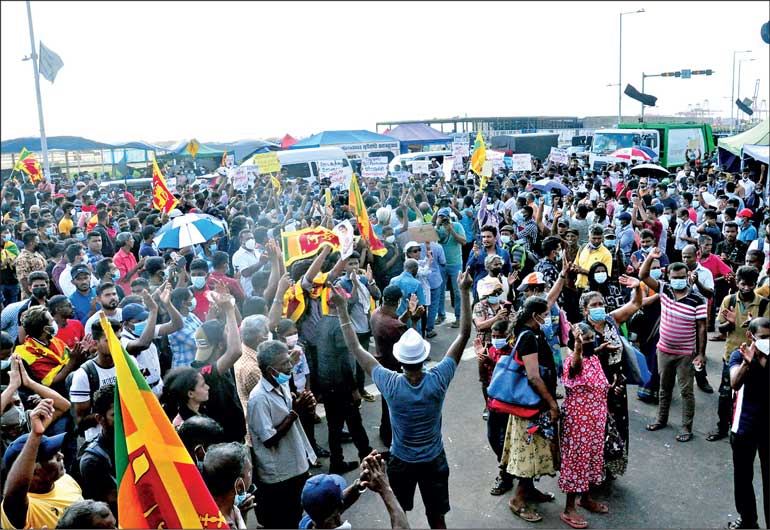Monday Feb 16, 2026
Monday Feb 16, 2026
Saturday, 9 July 2022 00:08 - - {{hitsCtrl.values.hits}}

Moving to a process of systems change by the people and for the people to develop a people-centred constitution that ensures all three branches of the Government are accountable to people, is the urgent need of the time
 Background
Background
For the first time in the history of our country, the people have awoken to the tragic reality that the post-independent system of government, which comprises the executive, legislative and judicial branches, has failed the people. What the people in Sri Lanka are demanding is a system overhaul because the three branches of the government, the executive, legislative body, and the judiciary, are acting above the law with no checks and balances in place. The real victims of this broken system are the innocent people who are facing life-threatening desperation.
Within this broken system, the executive acts in an arbitrary, non-consultative manner in many of its decision-making efforts. The legislative body has become completely subordinate to the arbitrary executive actions. This body also has become accustomed to acting in self-interest and is above the law and has lost representative credibility in front of the people. The Judiciary does not inherently hold constitutional credibility as its functions are heavily curtailed by the Constitution itself and narrowed to performing a subordinate and watchdog role to the executive and legislative bodies.
Now the country has reached a point of no return. A situation where every person suffers without access to basic needs and realises that the root of the crisis is nothing but the unaccountable governance system. People’s call for accountability of the Government is being ignored by the executive, and legislative branches of the Government and the judicial branch is constitutionally disabled to conduct a check and balance role. Despite the fact that the executive and legislative branches explicitly and/or impliedly endorse its inability, incapability and incompetence to manage the crisis, they are arrogant to stay in power in the pre-text of the constitutional provision that was deliberately crafted to protect the unaccountable governing system.
Intense demand for reform to develop and adopt appropriate policies become fruitless under this unaccountable and broken governing system that has been exposed to the world. In this context, there is a wider realisation among the people that the Government cannot be trusted to create a more accountable system of checks and balances that represents the needs of the people.
Despite the fact that the signs of failed state were alerted by a few people during the past and stressed the need for radical system change through a people-centred constitution, however, such discourses were not in the mainstream until the protest movement at Galle Face (Aragalaya) emerged. The Aragalaya as a whole has been demanding a system change and has been successful in creating consensus in the realisation that the whole governing system of the last 70 years failed the country and the people. The people have realised tinkering around the edges within the existing Constitution with Amendments only safeguards the lawless and broken system and the victims will continue to be the people. Therefore, moving to a process of systems change by the people and for the people to develop a people-centred constitution that ensures all three branches of the Government are accountable to people, is the urgent need of the time.
The author of this proposal outlines a three-phase strategic roadmap for the people-centred constitution. It is crafted under the spirit and intent of shaping a more perfect union for the people of the country with a governing system that represents the values and aspirations of the people and is accountable to the people. It is in line with the demands of the people of the country.
Phase 1: Creating the enabling environment
1.Introduce clause to the current Constitution to
i.establish an Elected Constitutional Assembly (ECA) and get the mandate of the people, and
ii.enable ECA to development of a people-centred constitution
2.Establish an Elected Constitutional Assembly (ECA) by a General Election
i.The role of the ECA is develop an interim constitution.
ECA can engage with collecting proposals for a new constitution from the people and institutions and draft a new interim constitution
ii.The Interim Constitution shall ensure among other things ‘limited government’
(An Accountable Government where all 3 arms are under the law).
iii.This Interim Constitution shall ensure that there is a judicial review mechanism where the actions and inactions of all three arms of the government are subject to judicial review.
iv.The Interim Constitution will be valid for a limited period until to ensure that the People-Centred Constitution (PCC) is developed by and for the people and then submitted for and approved by the people at a referendum.
Phase 2: Development phase:
1.ECA shall focus on three dimensions under this phase including developing an inclusive and formalised Framework for PCC (FPCC), people participatory constitution-making process, and the state capacity-building process. This will guarantee that every voter has the ability to be involved in all of the processes.
2.Framework for People-Centred Constitution comprises the following;
i.ECA shall establish a governance mechanism to manage the operationalisation of the constitution-making process.
a)This will facilitate the Constitution Development Process and ensure transparency and equal voice and opportunities for all parties involved to help shape the people’s constitution and no one feels left behind or ignored in the process.
ii.ECA shall establish public education and empowerment program:
a)To ensure every voter in the country understands the spirit, importance, and intent of the FPCC and their role in the process as citizens
b)The program shall establish that 100% of the voters are informed of the need for and importance of the People-Centred Constitution as the protection mechanism to make their government accountable in governing the affairs of the country and meeting the aspiration of the people. The empowerment process must have complete footprint within the FPCC.
iii.ECA shall establish a set of guiding principles:
a)To ensure that the People-Centred Constitution making process is guided by a set of common principles that will become the basis of decision-making.
b)Identification of the basic principles and goals a People-Centred Constitution should establish, which is agreeable to 100% of the people of the country.
iv.ECA shall establish people participatory mechanisms;
a)Enabling the people to engage in the constitution-making process, and
b)The mechanism shall have complete footprints of the peoples’ engagement in the constitution-making process.
3.People participatory constitution-making
a)Based on the established guidelines, utilising the developed people participatory mechanism, the empowered and informed voters engage in the constitution-making.
b)Ensure the footprint of over 95% of voters being captured in the mechanism
4.Harmonise the constitutional assurance with state capabilities
a)ECA shall ensure that each agency has the tools, knowledge, expertise, resources, and the mandate to act in the interests of the people based on the new constitution mandate.
Phase 3: Adoption of a new People-Centred Constitution
i.The People-Centred Constitution will be put forward for people referendum
ii.Before putting forward to the people referendum ECA shall ensure that
a)More than 95% of the voters become informed and empowered about the need for People-Centred Constitution (PCC), and
b)more than 90% of the voters’ footprint established in the new constitution-making process
iii.The People-Centred Constitution become to effect with the referendum
(The writer is a young academic specialising in constitution, law, and economy. His research focuses on the challenges of constitutional development in developing countries, building a framework for the people-centred constitution, the influence of populism over constitutionalism, and the devolution of power. He has completed his Master of Law (LL.M) at the University of Colombo and an MSc in International Management from the University of Liverpool. His recent research contribution includes a critical analysis of the constitutional and policy framework on the Right to access to higher education in Sri Lanka. He can be reached via [email protected].)